Business Law & Ethics: Impact of Brexit on UK Parliamentary Power
VerifiedAdded on 2023/06/10
|7
|1919
|496
Report
AI Summary
This report provides an overview of parliamentary sovereignty in the United Kingdom, focusing on the implications of Brexit. It defines parliamentary sovereignty as the supreme power of the UK parliament to make or unmake laws, free from interference by other governmental bodies or international entities like the European Union. The report details how Brexit has restored this sovereignty by removing the constraints imposed by EU law, allowing the UK to independently legislate on internal matters. It discusses key cases and acts that highlight the importance of parliamentary sovereignty in the UK's constitutional framework, both before and after Brexit. Furthermore, the report examines the effects of the separation on various sectors, including education, trade, and the movement of goods and services, emphasizing the challenges and opportunities that arise as the UK re-establishes itself as an independent nation in the global market. The conclusion underscores that the UK has regained control over its borders, commercial transactions, immigration policies, and law-making processes, marking a significant shift in its legal and political landscape.

Business Law and
Ethics
Ethics
Paraphrase This Document
Need a fresh take? Get an instant paraphrase of this document with our AI Paraphraser
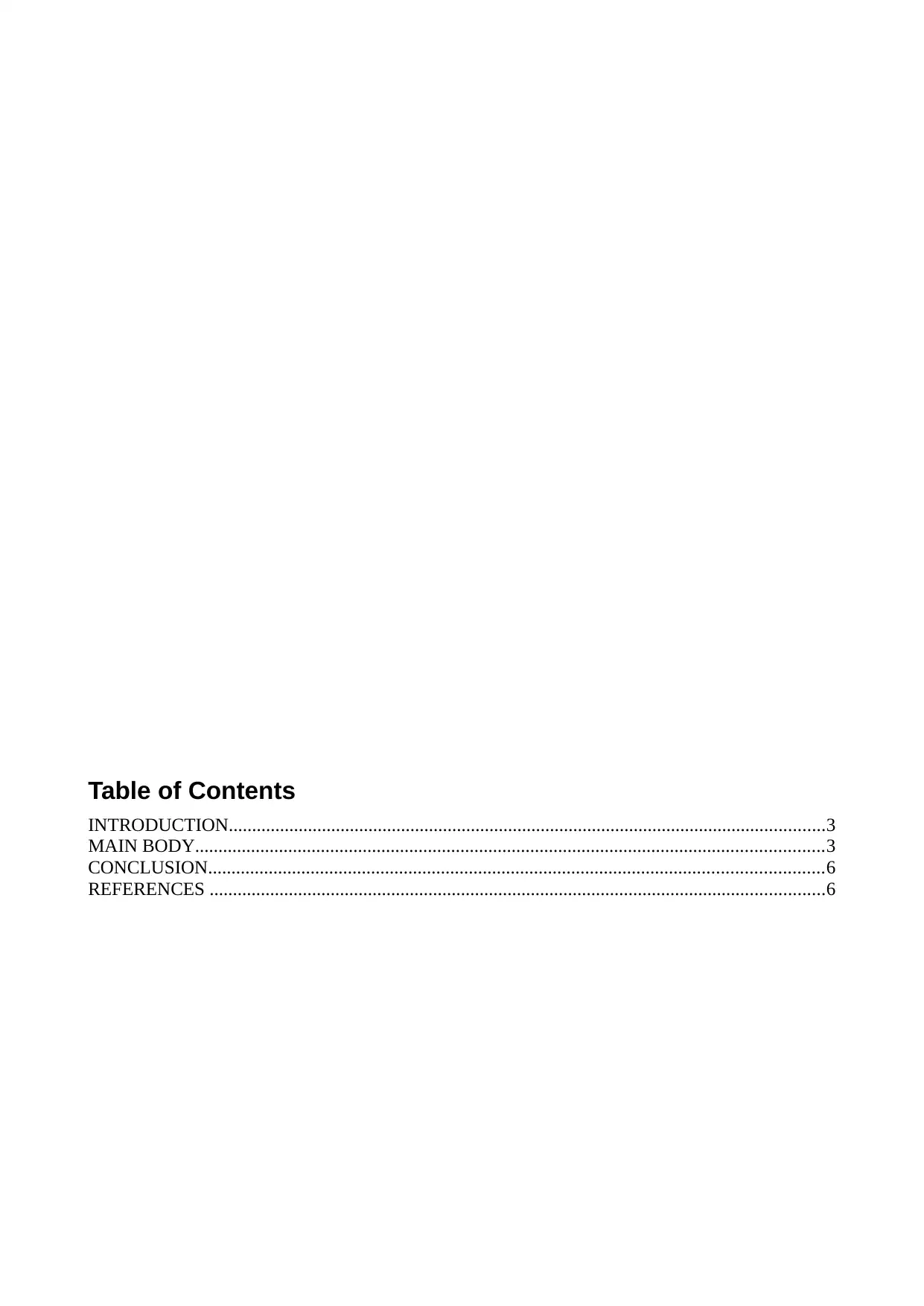
Table of Contents
INTRODUCTION................................................................................................................................3
MAIN BODY.......................................................................................................................................3
CONCLUSION....................................................................................................................................6
REFERENCES ....................................................................................................................................6
INTRODUCTION................................................................................................................................3
MAIN BODY.......................................................................................................................................3
CONCLUSION....................................................................................................................................6
REFERENCES ....................................................................................................................................6
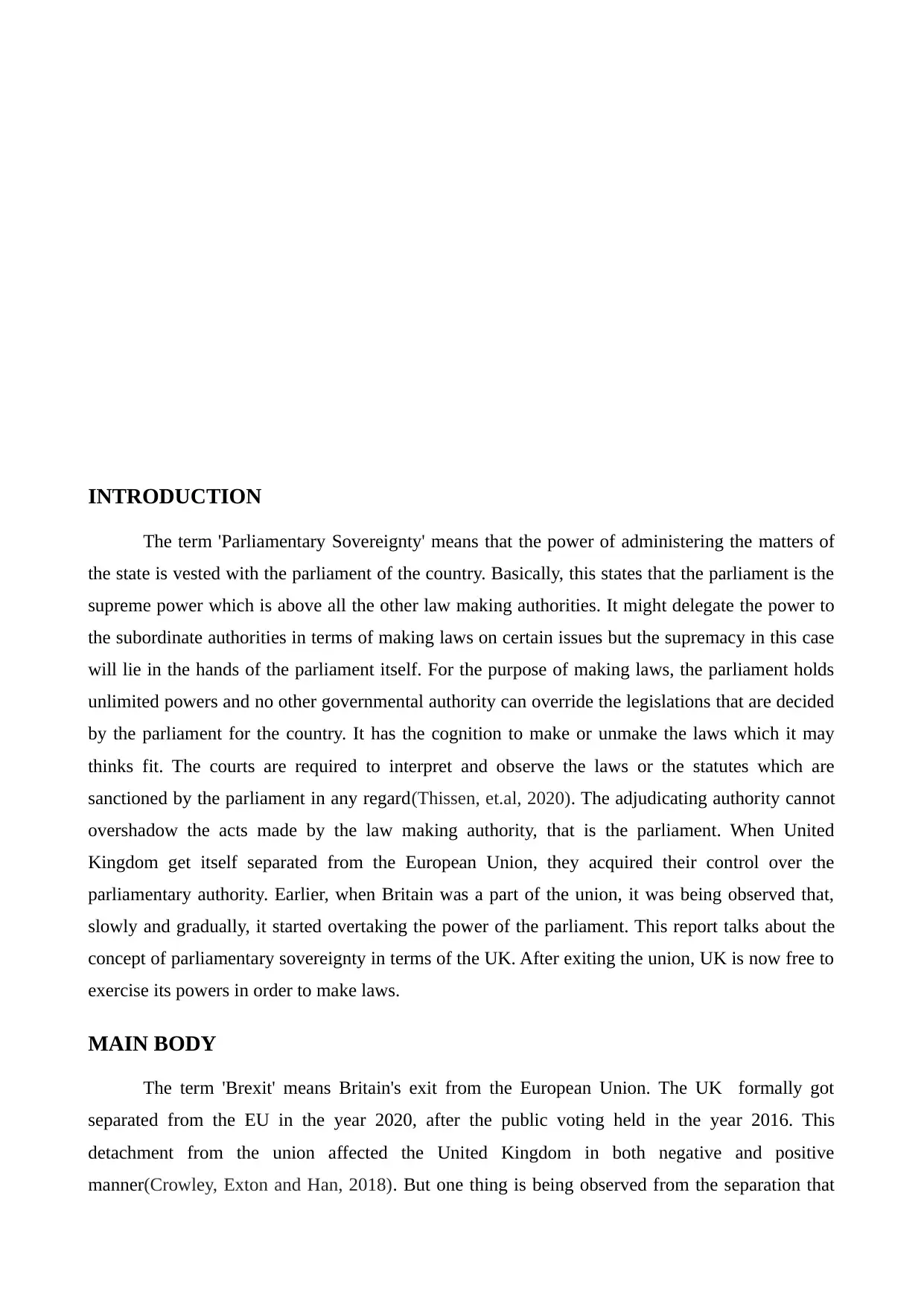
INTRODUCTION
The term 'Parliamentary Sovereignty' means that the power of administering the matters of
the state is vested with the parliament of the country. Basically, this states that the parliament is the
supreme power which is above all the other law making authorities. It might delegate the power to
the subordinate authorities in terms of making laws on certain issues but the supremacy in this case
will lie in the hands of the parliament itself. For the purpose of making laws, the parliament holds
unlimited powers and no other governmental authority can override the legislations that are decided
by the parliament for the country. It has the cognition to make or unmake the laws which it may
thinks fit. The courts are required to interpret and observe the laws or the statutes which are
sanctioned by the parliament in any regard(Thissen, et.al, 2020). The adjudicating authority cannot
overshadow the acts made by the law making authority, that is the parliament. When United
Kingdom get itself separated from the European Union, they acquired their control over the
parliamentary authority. Earlier, when Britain was a part of the union, it was being observed that,
slowly and gradually, it started overtaking the power of the parliament. This report talks about the
concept of parliamentary sovereignty in terms of the UK. After exiting the union, UK is now free to
exercise its powers in order to make laws.
MAIN BODY
The term 'Brexit' means Britain's exit from the European Union. The UK formally got
separated from the EU in the year 2020, after the public voting held in the year 2016. This
detachment from the union affected the United Kingdom in both negative and positive
manner(Crowley, Exton and Han, 2018). But one thing is being observed from the separation that
The term 'Parliamentary Sovereignty' means that the power of administering the matters of
the state is vested with the parliament of the country. Basically, this states that the parliament is the
supreme power which is above all the other law making authorities. It might delegate the power to
the subordinate authorities in terms of making laws on certain issues but the supremacy in this case
will lie in the hands of the parliament itself. For the purpose of making laws, the parliament holds
unlimited powers and no other governmental authority can override the legislations that are decided
by the parliament for the country. It has the cognition to make or unmake the laws which it may
thinks fit. The courts are required to interpret and observe the laws or the statutes which are
sanctioned by the parliament in any regard(Thissen, et.al, 2020). The adjudicating authority cannot
overshadow the acts made by the law making authority, that is the parliament. When United
Kingdom get itself separated from the European Union, they acquired their control over the
parliamentary authority. Earlier, when Britain was a part of the union, it was being observed that,
slowly and gradually, it started overtaking the power of the parliament. This report talks about the
concept of parliamentary sovereignty in terms of the UK. After exiting the union, UK is now free to
exercise its powers in order to make laws.
MAIN BODY
The term 'Brexit' means Britain's exit from the European Union. The UK formally got
separated from the EU in the year 2020, after the public voting held in the year 2016. This
detachment from the union affected the United Kingdom in both negative and positive
manner(Crowley, Exton and Han, 2018). But one thing is being observed from the separation that
⊘ This is a preview!⊘
Do you want full access?
Subscribe today to unlock all pages.

Trusted by 1+ million students worldwide
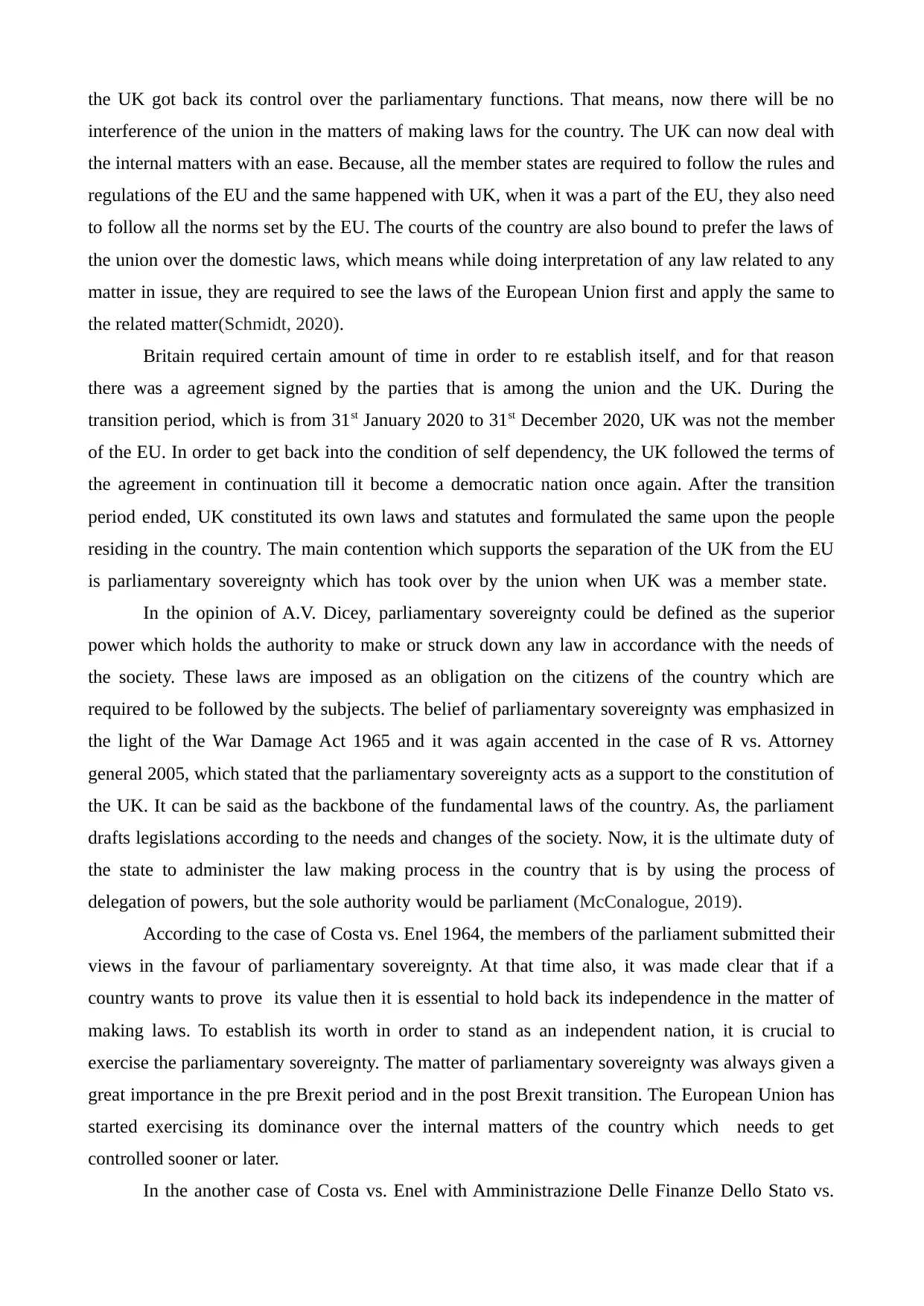
the UK got back its control over the parliamentary functions. That means, now there will be no
interference of the union in the matters of making laws for the country. The UK can now deal with
the internal matters with an ease. Because, all the member states are required to follow the rules and
regulations of the EU and the same happened with UK, when it was a part of the EU, they also need
to follow all the norms set by the EU. The courts of the country are also bound to prefer the laws of
the union over the domestic laws, which means while doing interpretation of any law related to any
matter in issue, they are required to see the laws of the European Union first and apply the same to
the related matter(Schmidt, 2020).
Britain required certain amount of time in order to re establish itself, and for that reason
there was a agreement signed by the parties that is among the union and the UK. During the
transition period, which is from 31st January 2020 to 31st December 2020, UK was not the member
of the EU. In order to get back into the condition of self dependency, the UK followed the terms of
the agreement in continuation till it become a democratic nation once again. After the transition
period ended, UK constituted its own laws and statutes and formulated the same upon the people
residing in the country. The main contention which supports the separation of the UK from the EU
is parliamentary sovereignty which has took over by the union when UK was a member state.
In the opinion of A.V. Dicey, parliamentary sovereignty could be defined as the superior
power which holds the authority to make or struck down any law in accordance with the needs of
the society. These laws are imposed as an obligation on the citizens of the country which are
required to be followed by the subjects. The belief of parliamentary sovereignty was emphasized in
the light of the War Damage Act 1965 and it was again accented in the case of R vs. Attorney
general 2005, which stated that the parliamentary sovereignty acts as a support to the constitution of
the UK. It can be said as the backbone of the fundamental laws of the country. As, the parliament
drafts legislations according to the needs and changes of the society. Now, it is the ultimate duty of
the state to administer the law making process in the country that is by using the process of
delegation of powers, but the sole authority would be parliament (McConalogue, 2019).
According to the case of Costa vs. Enel 1964, the members of the parliament submitted their
views in the favour of parliamentary sovereignty. At that time also, it was made clear that if a
country wants to prove its value then it is essential to hold back its independence in the matter of
making laws. To establish its worth in order to stand as an independent nation, it is crucial to
exercise the parliamentary sovereignty. The matter of parliamentary sovereignty was always given a
great importance in the pre Brexit period and in the post Brexit transition. The European Union has
started exercising its dominance over the internal matters of the country which needs to get
controlled sooner or later.
In the another case of Costa vs. Enel with Amministrazione Delle Finanze Dello Stato vs.
interference of the union in the matters of making laws for the country. The UK can now deal with
the internal matters with an ease. Because, all the member states are required to follow the rules and
regulations of the EU and the same happened with UK, when it was a part of the EU, they also need
to follow all the norms set by the EU. The courts of the country are also bound to prefer the laws of
the union over the domestic laws, which means while doing interpretation of any law related to any
matter in issue, they are required to see the laws of the European Union first and apply the same to
the related matter(Schmidt, 2020).
Britain required certain amount of time in order to re establish itself, and for that reason
there was a agreement signed by the parties that is among the union and the UK. During the
transition period, which is from 31st January 2020 to 31st December 2020, UK was not the member
of the EU. In order to get back into the condition of self dependency, the UK followed the terms of
the agreement in continuation till it become a democratic nation once again. After the transition
period ended, UK constituted its own laws and statutes and formulated the same upon the people
residing in the country. The main contention which supports the separation of the UK from the EU
is parliamentary sovereignty which has took over by the union when UK was a member state.
In the opinion of A.V. Dicey, parliamentary sovereignty could be defined as the superior
power which holds the authority to make or struck down any law in accordance with the needs of
the society. These laws are imposed as an obligation on the citizens of the country which are
required to be followed by the subjects. The belief of parliamentary sovereignty was emphasized in
the light of the War Damage Act 1965 and it was again accented in the case of R vs. Attorney
general 2005, which stated that the parliamentary sovereignty acts as a support to the constitution of
the UK. It can be said as the backbone of the fundamental laws of the country. As, the parliament
drafts legislations according to the needs and changes of the society. Now, it is the ultimate duty of
the state to administer the law making process in the country that is by using the process of
delegation of powers, but the sole authority would be parliament (McConalogue, 2019).
According to the case of Costa vs. Enel 1964, the members of the parliament submitted their
views in the favour of parliamentary sovereignty. At that time also, it was made clear that if a
country wants to prove its value then it is essential to hold back its independence in the matter of
making laws. To establish its worth in order to stand as an independent nation, it is crucial to
exercise the parliamentary sovereignty. The matter of parliamentary sovereignty was always given a
great importance in the pre Brexit period and in the post Brexit transition. The European Union has
started exercising its dominance over the internal matters of the country which needs to get
controlled sooner or later.
In the another case of Costa vs. Enel with Amministrazione Delle Finanze Dello Stato vs.
Paraphrase This Document
Need a fresh take? Get an instant paraphrase of this document with our AI Paraphraser
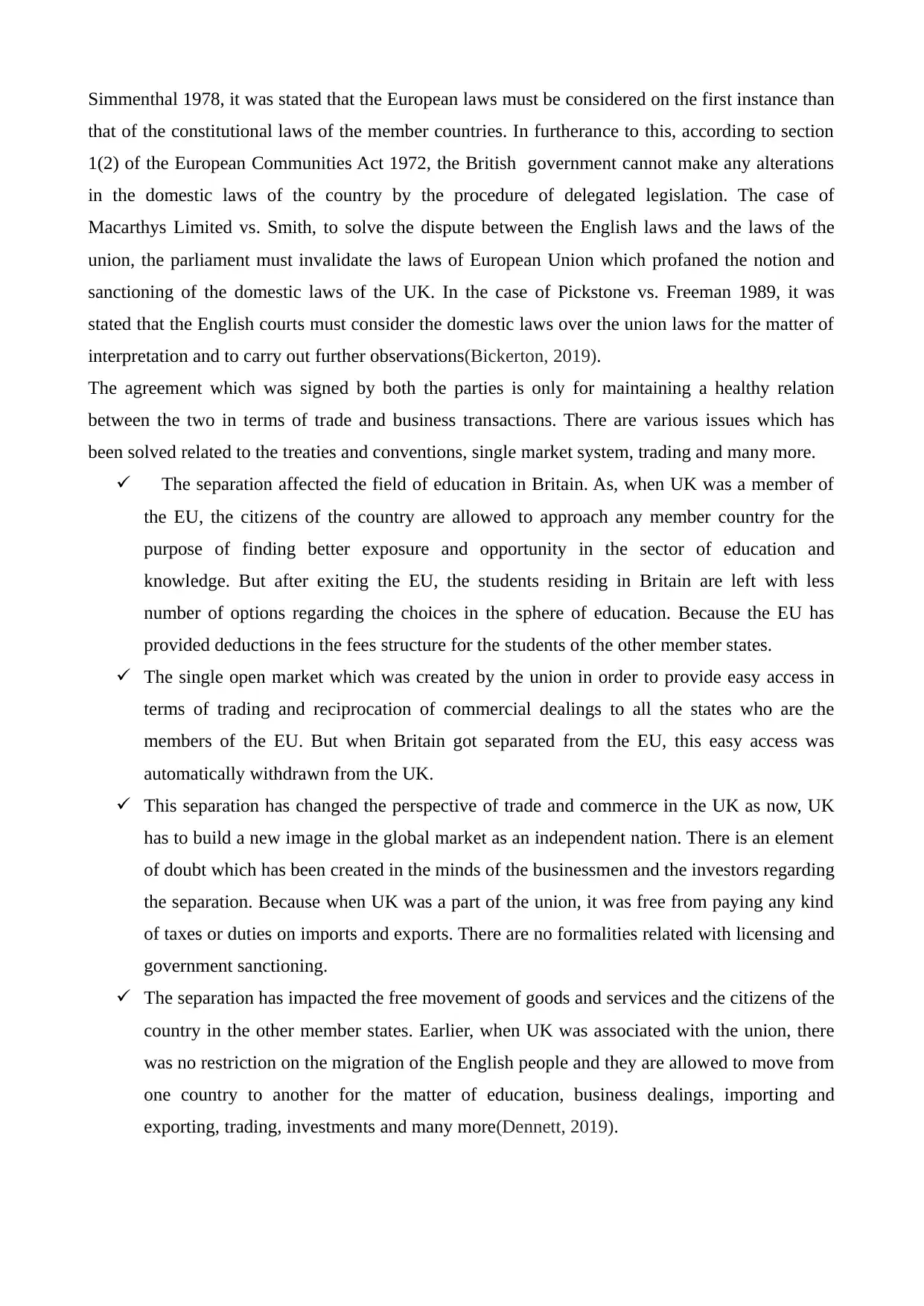
Simmenthal 1978, it was stated that the European laws must be considered on the first instance than
that of the constitutional laws of the member countries. In furtherance to this, according to section
1(2) of the European Communities Act 1972, the British government cannot make any alterations
in the domestic laws of the country by the procedure of delegated legislation. The case of
Macarthys Limited vs. Smith, to solve the dispute between the English laws and the laws of the
union, the parliament must invalidate the laws of European Union which profaned the notion and
sanctioning of the domestic laws of the UK. In the case of Pickstone vs. Freeman 1989, it was
stated that the English courts must consider the domestic laws over the union laws for the matter of
interpretation and to carry out further observations(Bickerton, 2019).
The agreement which was signed by both the parties is only for maintaining a healthy relation
between the two in terms of trade and business transactions. There are various issues which has
been solved related to the treaties and conventions, single market system, trading and many more.
The separation affected the field of education in Britain. As, when UK was a member of
the EU, the citizens of the country are allowed to approach any member country for the
purpose of finding better exposure and opportunity in the sector of education and
knowledge. But after exiting the EU, the students residing in Britain are left with less
number of options regarding the choices in the sphere of education. Because the EU has
provided deductions in the fees structure for the students of the other member states.
The single open market which was created by the union in order to provide easy access in
terms of trading and reciprocation of commercial dealings to all the states who are the
members of the EU. But when Britain got separated from the EU, this easy access was
automatically withdrawn from the UK.
This separation has changed the perspective of trade and commerce in the UK as now, UK
has to build a new image in the global market as an independent nation. There is an element
of doubt which has been created in the minds of the businessmen and the investors regarding
the separation. Because when UK was a part of the union, it was free from paying any kind
of taxes or duties on imports and exports. There are no formalities related with licensing and
government sanctioning.
The separation has impacted the free movement of goods and services and the citizens of the
country in the other member states. Earlier, when UK was associated with the union, there
was no restriction on the migration of the English people and they are allowed to move from
one country to another for the matter of education, business dealings, importing and
exporting, trading, investments and many more(Dennett, 2019).
that of the constitutional laws of the member countries. In furtherance to this, according to section
1(2) of the European Communities Act 1972, the British government cannot make any alterations
in the domestic laws of the country by the procedure of delegated legislation. The case of
Macarthys Limited vs. Smith, to solve the dispute between the English laws and the laws of the
union, the parliament must invalidate the laws of European Union which profaned the notion and
sanctioning of the domestic laws of the UK. In the case of Pickstone vs. Freeman 1989, it was
stated that the English courts must consider the domestic laws over the union laws for the matter of
interpretation and to carry out further observations(Bickerton, 2019).
The agreement which was signed by both the parties is only for maintaining a healthy relation
between the two in terms of trade and business transactions. There are various issues which has
been solved related to the treaties and conventions, single market system, trading and many more.
The separation affected the field of education in Britain. As, when UK was a member of
the EU, the citizens of the country are allowed to approach any member country for the
purpose of finding better exposure and opportunity in the sector of education and
knowledge. But after exiting the EU, the students residing in Britain are left with less
number of options regarding the choices in the sphere of education. Because the EU has
provided deductions in the fees structure for the students of the other member states.
The single open market which was created by the union in order to provide easy access in
terms of trading and reciprocation of commercial dealings to all the states who are the
members of the EU. But when Britain got separated from the EU, this easy access was
automatically withdrawn from the UK.
This separation has changed the perspective of trade and commerce in the UK as now, UK
has to build a new image in the global market as an independent nation. There is an element
of doubt which has been created in the minds of the businessmen and the investors regarding
the separation. Because when UK was a part of the union, it was free from paying any kind
of taxes or duties on imports and exports. There are no formalities related with licensing and
government sanctioning.
The separation has impacted the free movement of goods and services and the citizens of the
country in the other member states. Earlier, when UK was associated with the union, there
was no restriction on the migration of the English people and they are allowed to move from
one country to another for the matter of education, business dealings, importing and
exporting, trading, investments and many more(Dennett, 2019).
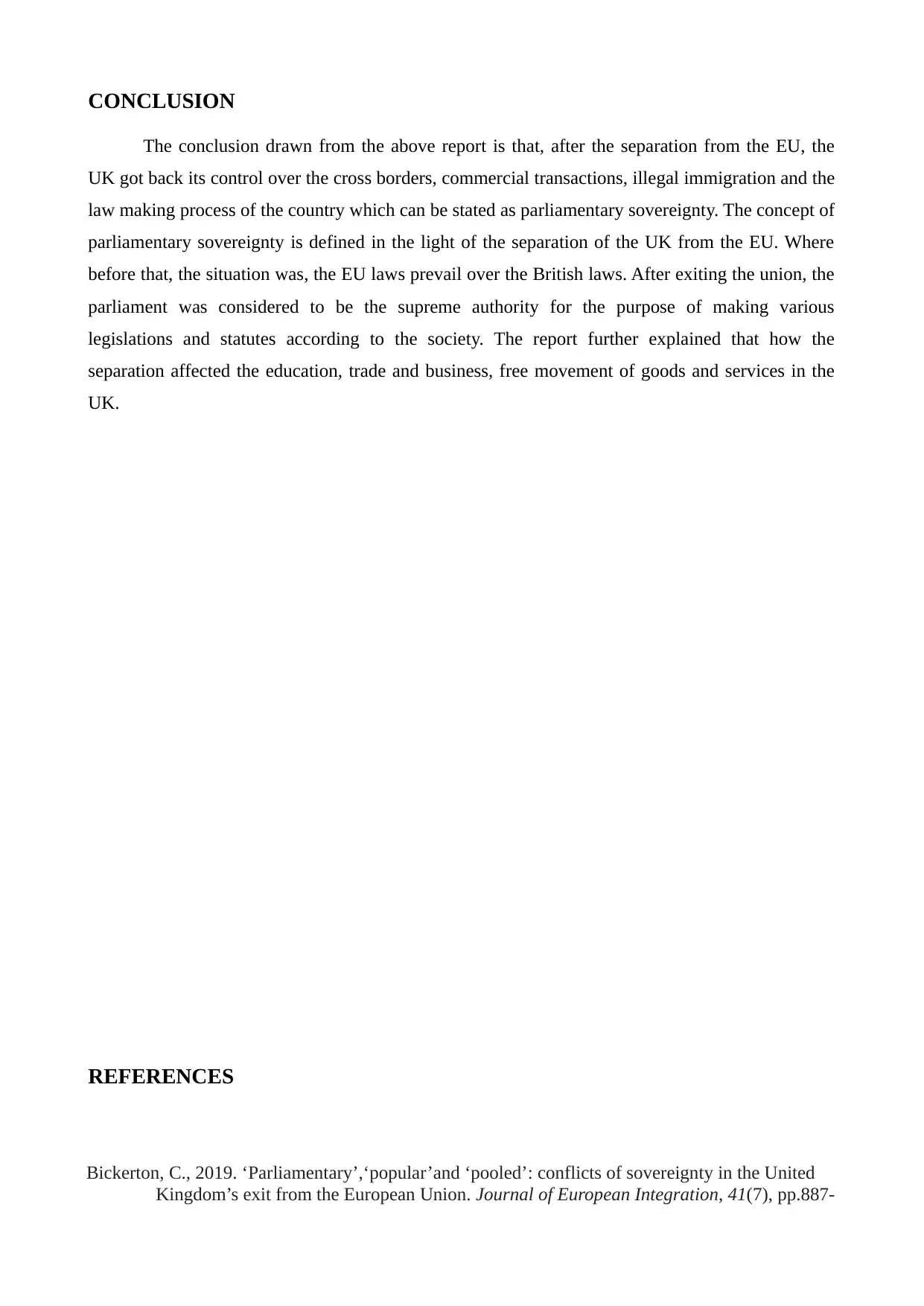
CONCLUSION
The conclusion drawn from the above report is that, after the separation from the EU, the
UK got back its control over the cross borders, commercial transactions, illegal immigration and the
law making process of the country which can be stated as parliamentary sovereignty. The concept of
parliamentary sovereignty is defined in the light of the separation of the UK from the EU. Where
before that, the situation was, the EU laws prevail over the British laws. After exiting the union, the
parliament was considered to be the supreme authority for the purpose of making various
legislations and statutes according to the society. The report further explained that how the
separation affected the education, trade and business, free movement of goods and services in the
UK.
REFERENCES
Bickerton, C., 2019. ‘Parliamentary’,‘popular’and ‘pooled’: conflicts of sovereignty in the United
Kingdom’s exit from the European Union. Journal of European Integration, 41(7), pp.887-
The conclusion drawn from the above report is that, after the separation from the EU, the
UK got back its control over the cross borders, commercial transactions, illegal immigration and the
law making process of the country which can be stated as parliamentary sovereignty. The concept of
parliamentary sovereignty is defined in the light of the separation of the UK from the EU. Where
before that, the situation was, the EU laws prevail over the British laws. After exiting the union, the
parliament was considered to be the supreme authority for the purpose of making various
legislations and statutes according to the society. The report further explained that how the
separation affected the education, trade and business, free movement of goods and services in the
UK.
REFERENCES
Bickerton, C., 2019. ‘Parliamentary’,‘popular’and ‘pooled’: conflicts of sovereignty in the United
Kingdom’s exit from the European Union. Journal of European Integration, 41(7), pp.887-
⊘ This is a preview!⊘
Do you want full access?
Subscribe today to unlock all pages.

Trusted by 1+ million students worldwide
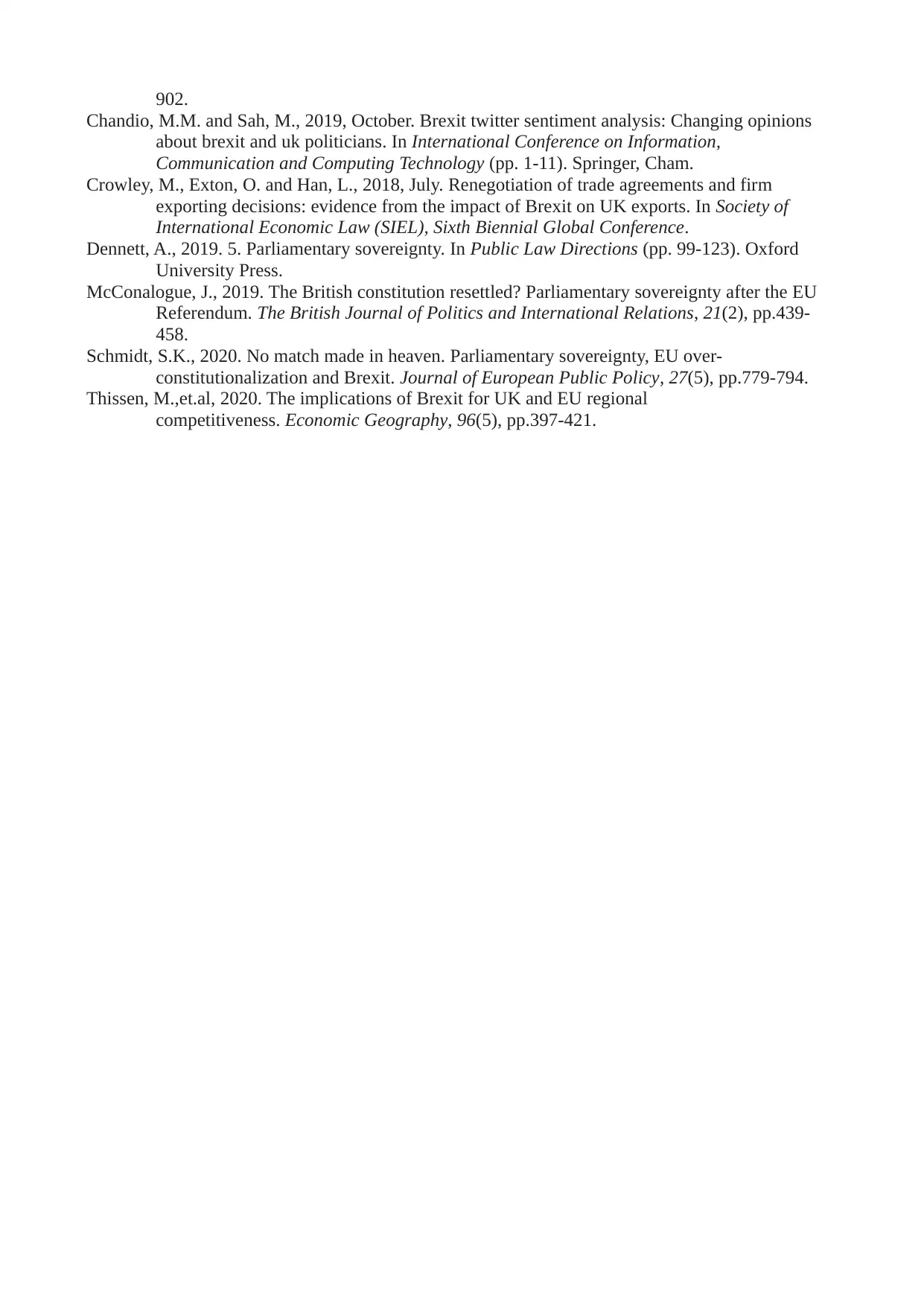
902.
Chandio, M.M. and Sah, M., 2019, October. Brexit twitter sentiment analysis: Changing opinions
about brexit and uk politicians. In International Conference on Information,
Communication and Computing Technology (pp. 1-11). Springer, Cham.
Crowley, M., Exton, O. and Han, L., 2018, July. Renegotiation of trade agreements and firm
exporting decisions: evidence from the impact of Brexit on UK exports. In Society of
International Economic Law (SIEL), Sixth Biennial Global Conference.
Dennett, A., 2019. 5. Parliamentary sovereignty. In Public Law Directions (pp. 99-123). Oxford
University Press.
McConalogue, J., 2019. The British constitution resettled? Parliamentary sovereignty after the EU
Referendum. The British Journal of Politics and International Relations, 21(2), pp.439-
458.
Schmidt, S.K., 2020. No match made in heaven. Parliamentary sovereignty, EU over-
constitutionalization and Brexit. Journal of European Public Policy, 27(5), pp.779-794.
Thissen, M.,et.al, 2020. The implications of Brexit for UK and EU regional
competitiveness. Economic Geography, 96(5), pp.397-421.
Chandio, M.M. and Sah, M., 2019, October. Brexit twitter sentiment analysis: Changing opinions
about brexit and uk politicians. In International Conference on Information,
Communication and Computing Technology (pp. 1-11). Springer, Cham.
Crowley, M., Exton, O. and Han, L., 2018, July. Renegotiation of trade agreements and firm
exporting decisions: evidence from the impact of Brexit on UK exports. In Society of
International Economic Law (SIEL), Sixth Biennial Global Conference.
Dennett, A., 2019. 5. Parliamentary sovereignty. In Public Law Directions (pp. 99-123). Oxford
University Press.
McConalogue, J., 2019. The British constitution resettled? Parliamentary sovereignty after the EU
Referendum. The British Journal of Politics and International Relations, 21(2), pp.439-
458.
Schmidt, S.K., 2020. No match made in heaven. Parliamentary sovereignty, EU over-
constitutionalization and Brexit. Journal of European Public Policy, 27(5), pp.779-794.
Thissen, M.,et.al, 2020. The implications of Brexit for UK and EU regional
competitiveness. Economic Geography, 96(5), pp.397-421.
1 out of 7
Related Documents
Your All-in-One AI-Powered Toolkit for Academic Success.
+13062052269
info@desklib.com
Available 24*7 on WhatsApp / Email
![[object Object]](/_next/static/media/star-bottom.7253800d.svg)
Unlock your academic potential
Copyright © 2020–2026 A2Z Services. All Rights Reserved. Developed and managed by ZUCOL.



